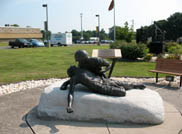 |
 |
More Info: -https://www.dep.pa.gov
|
IMPORTANT STORM WATER MANAGEMENT INFORMATION
When It Rains, It Drains
What is Storm Water?
Storm water is water from precipitation that flows across the ground or pavement when it rains, or when snow and ice have melted. The water seeps into the ground, or it drains into storm sewers or storm drains. These can be seen at street corners and along low points on the sides of local streets. Collectively, this draining water is called storm water runoff.
Only Rain Belongs In The Storm Drain
To prevent stormwater pollution and flooding, and control litter in your neighborhood it is important to the health of our waterways that storm drains stay clear and free of leaves, grass clippings, litter, waste, and chemicals. We can each do our part to help keep storm drains working as they should:
- Clear leafy debris and other material from the storm drain so water can flow into it.
- Move your car or other obstructions when your community schedules street sweeping. Municipalities sweep the streets to keep their storm drain systems working properly.
- Never put anything down a storm drain. This includes: dog poop whether it is bagged or not, trash, cigarettes, hazardous wastes, such as household cleaners, unused paint, paint thinner, used oil, and lawn care chemicals.
- Pick up after your pet and toss the waste in the trash.
- Hang on to your leftover paints and pesticides and take them to the nearest household hazardous waste collection location.
- Don’t dump outdated medicines down a storm drain.
- Pick up litter so it never makes it to a storm drain.
- Remember, we all live downstream!
Problems with "Rain and Drain"
Storm water can become a problem when it picks up debris, chemicals, dirt and other pollutants along its path, or when it causes flooding and erosion of stream banks. Storm water travels through a system of pipes and roadside ditches that make up storm drainage systems. Eventually, the water flows into a lake, stream, river, wetland or coastal water. Storm water does not get treated.
Rain is an important part of nature's water cycle, but there are times it can do more harm than good.
Problems related to storm water runoff can include:
- Flooding caused by too much water flowing over hard surfaces such as roads and parking lots, instead of soaking into the ground.
- High costs may result when storm drains, clogged with excessive amounts of dirt and debris, must be maintained and cleaned frequently.
- Storm water carries sediment and pollutants that degrade fish habitats, decreasing sportfish populations.
- More expensive treatment technologies must be found to remove pollutants from storm water that eventually can reach the drinking water supply.
- Swimming and other water sports are adversely affected by increased bacteria levels that make these practices unsafe.
How to Prevent Storm Water Pollution
- Properly dispose of hazardous substances such as used oil, cleaning supplies and paint. Never pour any of these items into any part of a storm drain system, and report to authorities anyone who does.
- Use pesticides, fertilizers, and herbicides properly and efficiently to prevent excess runoff.
- Report any poorly-managed construction sites in the area that may be responsible for leaving worksite debris in the storm water system.
- Install rain gardens or rain barrels on residential property, to capture rainwater and keep it on site, instead of letting it drain away into the storm drainage system.
- Report any discharges from storm water outfalls noticed during periods of dry weather. (Outfalls are points at which storm water drains from a storm drainage system into a receiving body of water such as a lake, stream, or river.)
- Pick up after pets and dispose of their waste properly. No matter where pets make a mess, whether in the back yard or in a park, storm water runoff can carry the waste from the land through the storm sewer system, to a stream or other body of water. Pet waste can contribute harmful bacteria, parasites and viruses to water.
- Any materials that could pollute storm water should be stored indoors. Use outdoor storage containers that do no rust or leak to eliminate exposure of materials to storm water.
- Properly dispose of vehicle fluids such as oil, grease, gas, antifreeze, and brake fluid that may leak or drip onto paved areas.
- Refrain from dumping debris, leaves, etc. into storm drain inlets. Bristol Township regularly maintains and cleans out inlets as weather permits.
What's Being Done...
Bristol Township, in conjunction with State and Federal departments, is preventing storm water pollution through its Storm Water Management Program, which addresses pollution issues from construction and development sites, illegal commercial and residential dumping. The program emphasizes and enforces proper, safe housekeeping practices and pollution prevention, and continues to educate residents to get the community involved in ensuring that our storm waters are kept clean.
For further information about storm water management and pollution prevention, please contact:
- Pennsylvania Department of Environmental Protection at www.dep.pa.gov
- PADEP MS4 Information
- Storm Water FAQ
- Bristol Township at manager@bristoltownship.org
- Also read the When It Rains, It Drains Brochure, click here.
Powered by Savvy Software